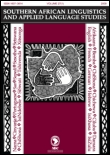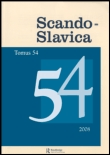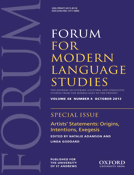
Italica Belgradensia
Scope & Guideline
Championing Rigorous Research in Cultural Discourses.
Introduction
Aims and Scopes
- Promotion of Italian Language and Culture:
The journal emphasizes the importance of promoting the Italian language and culture, particularly in non-Italian contexts such as North Macedonia and Montenegro, showcasing educational initiatives and cultural activities. - Translation Studies:
A significant portion of the research focuses on translation, examining the complexities and nuances involved in translating Italian texts, as well as the role of translators in cultural exchanges. - Intercultural Competence:
The exploration of intercultural communicative competence is prominent, particularly within educational settings, highlighting how language learning contributes to broader cultural understanding. - Literary Analysis and Critique:
The journal includes critical analyses of Italian literature, providing insights into historical and contemporary works, with a focus on authors and themes relevant to the Balkan context. - Sociolinguistic Perspectives:
Research often includes sociolinguistic perspectives, analyzing language use within specific communities, language policy, and the impact of migration on language dynamics in the region.
Trending and Emerging
- Cultural Exchange and Identity:
There is an increasing focus on the interplay between Italian culture and the identities of Balkan communities, exploring how migration and cultural exchange shape language use and cultural perceptions. - Educational Approaches to Language Teaching:
Recent works emphasize innovative educational methodologies for teaching Italian in primary and secondary schools, reflecting a growing interest in pedagogical practices and their effectiveness in fostering language acquisition. - Gender Studies and Sexuality in Literature:
Emerging themes include gender studies and the representation of sexuality in literature, indicating a broader cultural discourse that intersects with Italian literary studies. - Sociolinguistics and Language Policy:
The journal is increasingly addressing sociolinguistic issues, particularly the implications of language policies in educational settings and their effects on intercultural communication. - Translation and Adaptation of Literature:
There is a notable trend in examining the translation and adaptation of literary works, focusing on how these processes affect cultural understanding and literary reception in different linguistic contexts.
Declining or Waning
- Historical Linguistics:
There appears to be a decrease in articles focused on historical linguistics or diachronic studies of the Italian language, suggesting a shift towards contemporary issues in language and culture. - Futurism and Dadaism:
While previously discussed, themes related to Futurism and Dadaism in Italian literature seem to have waned, indicating a potential diminishing interest in avant-garde movements in favor of more current literary analysis. - Medieval Studies:
Research focusing on medieval Italian literature and its rhetorical frameworks has become less frequent, possibly overshadowed by modern and contemporary literary explorations. - Regional Dialects:
There has been a noticeable decrease in discussions surrounding regional dialects of Italian, particularly in the context of their sociolinguistic implications, which may indicate a shift towards a more standardized approach in language studies.
Similar Journals

RILCE-Revista de Filologia Hispanica
Elevating Academic Discourse in Linguistics and LiteratureRILCE-Revista de Filologia Hispanica is a distinguished academic journal published by the Universidad de Navarra, serving as a pivotal platform for scholarship in the field of Hispanic Philology. Established in 2008 and ongoing through 2024, RILCE stands out in the academic community with a robust reputation reflected in its 2023 ranking; it holds Q2 status in Linguistics and Language and Q1 in Literature and Literary Theory. The journal is indexed in Scopus, where it ranks 165th out of 1106 in Literature and Literary Theory, showcasing its significant impact with an 84th percentile ranking. Located in Pamplona, Spain, RILCE aims to foster critical dialogues and disseminate innovative research that advances the understanding of linguistic and literary studies, making it an essential resource for researchers, professionals, and students alike. Although specific open access options may be limited, RILCE remains committed to enriching the academic dialogue within its disciplines.

REVISTA DE FILOLOGIA DE LA UNIVERSIDAD DE LA LAGUNA
Navigating the rich tapestry of language and its applications.REVISTA DE FILOLOGIA DE LA UNIVERSIDAD DE LA LAGUNA is a prestigious academic journal dedicated to advancing the fields of linguistics and language studies. Published by the Universidad de la Laguna in Spain, this journal serves as an essential resource for researchers, professionals, and students alike, offering critical insights and scholarly articles that contribute to the understanding of language and its intricacies. With its inclusion in the Q3 category of the 2023 Linguistics and Language rankings and Scopus rankings, it demonstrates a growing impact within the academic community, while maintaining a commitment to fostering dialogue and disseminating valuable research. As a platform for innovative ideas and diverse perspectives, the journal aims to bridge theoretical approaches and practical applications, ensuring that readers are well-equipped to engage with contemporary issues in linguistics. Although it is currently not open access, the journal remains an influential contributor to the language and linguistics sectors, operating from the picturesque Canary Islands, enhancing its appeal not only as a scholarly resource but also as a culturally rich platform for academic expression.

Southern African Linguistics and Applied Language Studies
Navigating Language Dynamics in a Diverse RegionSouthern African Linguistics and Applied Language Studies is a prestigious journal dedicated to the exploration and analysis of linguistics and applied language studies within the Southern African context. Published by Taylor & Francis Ltd, this esteemed journal has established itself as a significant platform for scholars and practitioners since its inception in 2003. With an impressive Q2 ranking in the Linguistics and Language category and a current Scopus rank of #430 out of 1167, it occupies a vital position in the academic landscape, appealing to a diverse readership keen on linguistic research, language policy, and applied linguistics. While the journal is not currently open access, it provides comprehensive insights and scholarly articles that foster understanding and innovation in linguistic practices and language education. As of 2024, the journal continues to deepen its impact through rigorous peer-review and a commitment to advancing knowledge, making it a key resource for researchers, educators, and students seeking to navigate the complexities of language within the Southern African region and beyond.

MODERNA SPRAK
Advancing Knowledge in Modern LinguisticsMODERNA SPRAK, published by LMS-Modern Language Teachers Association, is a vital journal in the field of linguistics and language studies that has been contributing to academic discourse since its inception in 2002. With an ISSN of 2000-3560, this Swedish journal provides a platform for researchers, educators, and language enthusiasts to explore contemporary issues and advancements in linguistics. Despite its Q4 category ranking in the 2023 category quartiles, its focus on diverse linguistic perspectives and innovative methodologies ensures its continued relevance and importance. As of 2023, it holds notable ranks within Scopus, placing it within the lower percentile of its categories—yet this offers a unique opportunity for emerging scholars to contribute to its growth and visibility. While MODERNA SPRAK is not an open access journal, it serves as a rich resource for academic networking and knowledge sharing in the evolving landscape of language education and research. The journal's commitment to fostering scholarship within an inclusive framework makes it an essential read for those engaged in the language sciences across various educational contexts.

Scando-Slavica
Advancing Knowledge in the Heart of Nordic and Slavic InteractionsScando-Slavica is a renowned academic journal published by ROUTLEDGE JOURNALS, TAYLOR & FRANCIS LTD, specializing in the rich interplay of Scandinavian and Slavic studies. With its ISSN 0080-6765 and E-ISSN 1600-082X, the journal has been a critical resource for scholars since its inception in 1954, covering a wide range of disciplines including archaeology, cultural studies, history, linguistics, and literature. As of 2023, it has consistently ranked in the third quartile across various categories, indicating its influential role in disseminating innovative research within the arts and humanities. With a focus on interdisciplinary dialogue, Scando-Slavica aims to foster a deeper understanding of cultural exchanges and linguistic connections, making it an essential read for researchers, professionals, and students interested in exploring the complexities of Nordic and Slavic interactions. While currently not an open access journal, its contributions have garnered substantial citations, bolstering its academic impact and relevance in a diverse scholarly landscape.

Cadernos de Letras da UFF
Exploring the Depths of Language and HistoryCadernos de Letras da UFF is a prominent academic journal published by the Department of History at the Federal University of Fluminense in Brazil. Since its transition to Open Access in 2014, it has fostered a spirit of collaboration and dissemination in the field of Literature and Linguistics, welcoming contributions that explore various aspects of literary studies, historical literature contexts, and linguistic phenomena. With a commitment to quality and academic rigor, the journal serves as a vital resource for scholars, practitioners, and students engaged in the humanities. The journal is dedicated to the advancement of knowledge through innovative research and critical analyses, making it an essential platform for sharing ideas with a global audience. The journal is based in Niterói, RJ, Brazil, and is indexed in various academic databases, enhancing its visibility and impact within the scholarly community.

Jordan Journal of Modern Languages & Literature
Cultivating Knowledge in Linguistics and LiteratureJordan Journal of Modern Languages & Literature is a prestigious academic journal published by Yarmouk University, Deanship of Research & Graduate Studies. This journal serves as a vital platform for scholars and researchers in the fields of linguistics and literature, offering a well-rounded examination of modern languages and literary theory. With an impressive Q2 ranking in Linguistics and Language and a Q1 distinction in Literature and Literary Theory as of 2023, it consistently features high-quality research that contributes to the advancement of knowledge in these domains. The Scopus rankings further reflect its academic rigor, placing it in the 79th percentile for Literature and Literary Theory and maintaining significant influence in related fields, making it an essential resource for researchers, professionals, and students alike. Although it does not operate under an open-access model, the journal's commitment to publishing groundbreaking studies can significantly aid in the understanding and progression of modern linguistic and literary practices. The Jordan Journal of Modern Languages & Literature continues to be an influential voice in fostering scholarly dialogue and advancing research in the humanities.

FORUM FOR MODERN LANGUAGE STUDIES
Elevating Research in Literature and LinguisticsFORUM FOR MODERN LANGUAGE STUDIES is a prestigious academic journal published by Oxford University Press that has been serving the fields of literature and linguistics since its inception in 1965. This journal, with an ISSN of 0015-8518 and an E-ISSN of 1471-6860, plays a crucial role in advancing scholarly discourse on modern language studies, including literature and literary theory. With an impactful presence in both the linguistic and literary domains, it has been recognized in 2023 with a category ranking of Q2 in Literature and Literary Theory and Q3 in Linguistics and Language. It stands out in the competitive landscape, holding a notable position within Scopus rankings, including a 70th percentile ranking in Literature & Literary Theory. While the journal currently does not offer open access options, it remains a vital resource for researchers, educators, and students passionate about the transformative power of language and literature. Its commitment to quality research and robust academic discussion underscores its importance, making it a key platform for those aiming to contribute to modern language scholarship.

Naslede
Illuminating emerging trends in arts and literature.Naslede is a distinguished scholarly journal published by the University of Kragujevac, Faculty of Philology and Arts. With an ISSN and E-ISSN of 1820-1768, it serves as a vital platform for the dissemination of research in the fields of philology, arts, and cultural studies. The journal aspires to foster academic dialogue and scholarly exchange, providing researchers, professionals, and students with access to high-quality, peer-reviewed articles that explore the intersections of language, literature, and artistic expression. While it currently does not offer open access options, the significance of Naslede within its field cannot be overstated, as it contributes to the broader academic community by highlighting innovative research and emerging trends in the humanities. Located in Kragujevac, Serbia, the journal is positioned to bridge local and international scholarship, making it an essential resource for those dedicated to advancing knowledge in these disciplines.

Studia Universitatis Babes-Bolyai Philologia
Fostering Innovation in Philological ResearchWelcome to Studia Universitatis Babes-Bolyai Philologia, a distinguished journal published by UNIV BABES-BOLYAI, which has proudly embraced Open Access since 2021. With an ISSN of 1220-0484 and an E-ISSN of 2065-9652, this journal serves as a vital platform for scholars in the field of philology, offering a rich repository of contemporary research and innovative thought. Hailing from the vibrant academic community of Cluj-Napoca, Romania, the journal aims to foster interdisciplinary dialogue and promote cutting-edge studies that explore linguistic, literary, and cultural dynamics across the globe. By providing unrestricted access to its content, Studia Universitatis Babes-Bolyai Philologia ensures that vital research is available to a worldwide audience, empowering researchers, professionals, and students to engage with and contribute to the ever-evolving discourse in philological studies.